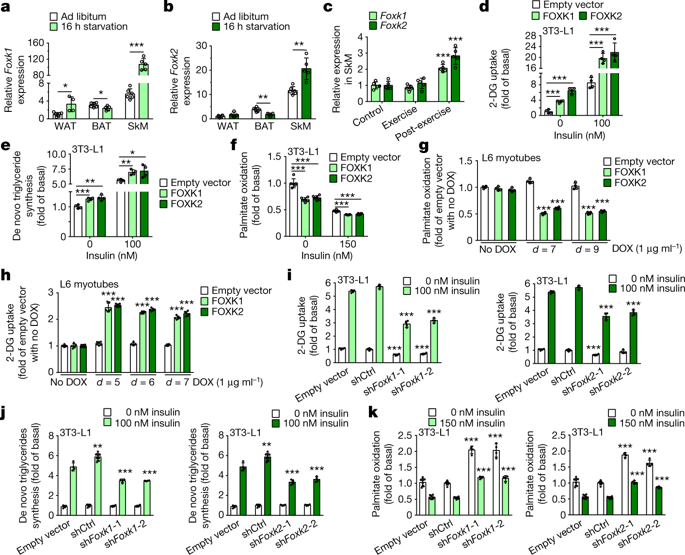Our official English website, www.x-mol.net, welcomes your
feedback! (Note: you will need to create a separate account there.)
FOXK1 and FOXK2 regulate aerobic glycolysis
Nature ( IF 50.5 ) Pub Date : 2019-01-30 , DOI: 10.1038/s41586-019-0900-5 Valentina Sukonina , Haixia Ma , Wei Zhang , Stefano Bartesaghi , Santhilal Subhash , Mikael Heglind , Håvard Foyn , Matthias J. Betz , Daniel Nilsson , Martin E. Lidell , Jennifer Naumann , Saskia Haufs-Brusberg , Henrik Palmgren , Tanmoy Mondal , Muheeb Beg , Mark P. Jedrychowski , Kjetil Taskén , Alexander Pfeifer , Xiao-Rong Peng , Chandrasekhar Kanduri , Sven Enerbäck
Nature ( IF 50.5 ) Pub Date : 2019-01-30 , DOI: 10.1038/s41586-019-0900-5 Valentina Sukonina , Haixia Ma , Wei Zhang , Stefano Bartesaghi , Santhilal Subhash , Mikael Heglind , Håvard Foyn , Matthias J. Betz , Daniel Nilsson , Martin E. Lidell , Jennifer Naumann , Saskia Haufs-Brusberg , Henrik Palmgren , Tanmoy Mondal , Muheeb Beg , Mark P. Jedrychowski , Kjetil Taskén , Alexander Pfeifer , Xiao-Rong Peng , Chandrasekhar Kanduri , Sven Enerbäck

|
Adaptation to the environment and extraction of energy are essential for survival. Some species have found niches and specialized in using a particular source of energy, whereas others—including humans and several other mammals—have developed a high degree of flexibility1. A lot is known about the general metabolic fates of different substrates but we still lack a detailed mechanistic understanding of how cells adapt in their use of basic nutrients2. Here we show that the closely related fasting/starvation-induced forkhead transcription factors FOXK1 and FOXK2 induce aerobic glycolysis by upregulating the enzymatic machinery required for this (for example, hexokinase-2, phosphofructokinase, pyruvate kinase, and lactate dehydrogenase), while at the same time suppressing further oxidation of pyruvate in the mitochondria by increasing the activity of pyruvate dehydrogenase kinases 1 and 4. Together with suppression of the catalytic subunit of pyruvate dehydrogenase phosphatase 1 this leads to increased phosphorylation of the E1α regulatory subunit of the pyruvate dehydrogenase complex, which in turn inhibits further oxidation of pyruvate in the mitochondria—instead, pyruvate is reduced to lactate. Suppression of FOXK1 and FOXK2 induce the opposite phenotype. Both in vitro and in vivo experiments, including studies of primary human cells, show how FOXK1 and/or FOXK2 are likely to act as important regulators that reprogram cellular metabolism to induce aerobic glycolysis.The Forkhead transcription factors FOXK1 and FOXK2, which are induced by starvation, reprogram cellular metabolism to induce aerobic glycolysis.
中文翻译:

FOXK1 和 FOXK2 调节有氧糖酵解
适应环境和提取能源对于生存至关重要。一些物种找到了生态位并专门使用特定的能量来源,而其他物种——包括人类和其他几种哺乳动物——已经发展出高度的灵活性1。关于不同底物的一般代谢命运有很多了解,但我们仍然缺乏对细胞在使用基本营养素时如何适应的详细机制理解。在这里,我们表明密切相关的禁食/饥饿诱导的叉头转录因子 FOXK1 和 FOXK2 通过上调有氧糖酵解所需的酶机制(例如,己糖激酶-2、磷酸果糖激酶、丙酮酸激酶和乳酸脱氢酶)来诱导有氧糖酵解,同时通过增加丙酮酸脱氢酶激酶 1 和 4 的活性来抑制线粒体中丙酮酸的进一步氧化。再加上抑制丙酮酸脱氢酶磷酸酶 1 的催化亚基,这导致丙酮酸 E1α 调节亚基的磷酸化增加脱氢酶复合物,进而抑制线粒体中丙酮酸的进一步氧化——相反,丙酮酸被还原为乳酸。FOXK1 和 FOXK2 的抑制诱导相反的表型。体外和体内实验,包括对原代人类细胞的研究,都表明 FOXK1 和/或 FOXK2 可能作为重编程细胞代谢以诱导有氧糖酵解的重要调节剂。Forkhead 转录因子 FOXK1 和 FOXK2,由饥饿,
更新日期:2019-01-30
中文翻译:

FOXK1 和 FOXK2 调节有氧糖酵解
适应环境和提取能源对于生存至关重要。一些物种找到了生态位并专门使用特定的能量来源,而其他物种——包括人类和其他几种哺乳动物——已经发展出高度的灵活性1。关于不同底物的一般代谢命运有很多了解,但我们仍然缺乏对细胞在使用基本营养素时如何适应的详细机制理解。在这里,我们表明密切相关的禁食/饥饿诱导的叉头转录因子 FOXK1 和 FOXK2 通过上调有氧糖酵解所需的酶机制(例如,己糖激酶-2、磷酸果糖激酶、丙酮酸激酶和乳酸脱氢酶)来诱导有氧糖酵解,同时通过增加丙酮酸脱氢酶激酶 1 和 4 的活性来抑制线粒体中丙酮酸的进一步氧化。再加上抑制丙酮酸脱氢酶磷酸酶 1 的催化亚基,这导致丙酮酸 E1α 调节亚基的磷酸化增加脱氢酶复合物,进而抑制线粒体中丙酮酸的进一步氧化——相反,丙酮酸被还原为乳酸。FOXK1 和 FOXK2 的抑制诱导相反的表型。体外和体内实验,包括对原代人类细胞的研究,都表明 FOXK1 和/或 FOXK2 可能作为重编程细胞代谢以诱导有氧糖酵解的重要调节剂。Forkhead 转录因子 FOXK1 和 FOXK2,由饥饿,































 京公网安备 11010802027423号
京公网安备 11010802027423号